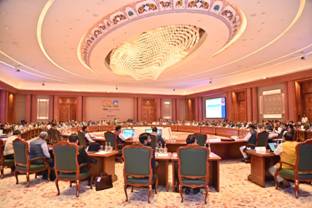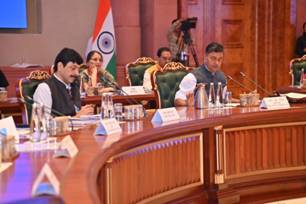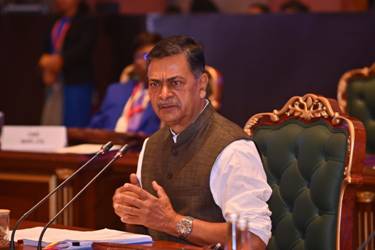Ministry of Power

National Conference of Power and New & Renewable Energy Ministers of States and UTs held under the Chairmanship of Shri R.K.Singh, Union Minister of Power & Renewable Energy, concludes with emphasis on ensuring 24X7 quality electricity supply to power a growing economy
States advised to maintain adequate coal stocks to meet rising energy demand
Work towards reducing the time for new connections and making the electricity available without any load shedding: Shri R. K. Singh, Union Power & NRE Minister
States advised to form Energy Transition Committees under Chief Secretary
Shri R. K. Singh stresses the need to focus on PSPs to meet demand during Non-Solar Hours
Union Power & NRE Minister asks States and UTs to Install Pre-Paid Smart Meters in all Government Departments
Shri R. K. Singh stresses the need to focus on PSPs to meet demand during Non-Solar Hours
Posted On: 08 NOV 2023 3:44PM by PIB Delhi
National Conference of Power and Renewable Energy Ministers of States and UTs was held on 06th and 07thNovember 2023 at Bharat Mandapam in New Delhi. Shri R. K Singh, Union Minister of Power and NRE presided over the conference. Secretary (Power), Secretary (MNRE), Deputy CMs/ Power/ NRE Ministers of States along with Principal Secretaries of States and UTs attended the conference.


Detailed deliberations were held with focus on (I) India’s NDC (Nationally Determined Contributions) and new RPO (Renewable Purchase Obligations), PM KUSUM Scheme, Rooftop Solar Scheme, National Green Hydrogen Mission, Solar Parks, Green Energy Corridors, Issues related to PLI Scheme, Wind Energy and Green Open Access Rules; (II) Review of RDSS (Revamped Distribution Sector Scheme), Viability Matrices of DISCOMs, Increasing Power Demand and Capacity Addition, Pumped Storage Projects (PSPs) and (III) National Transmission Plan. Implementation of Rights of Electricity Consumer Rules, Carbon Market, Energy Transition, Role of States in e-mobility and EESL Dues in Street lights National Programme were also discussed. The states provided their inputs and suggestions on each of these pertinent issues.
Major thrust areas deliberated during the Conference are:
- Expedite commissioning of conventional and renewable energy projects by all States.
- Plan for future capacity addition.
- States were advised to maintain adequate stock of coal to meet the rising energy demand during April ’24 to June’24. Demand can go up by 250 GW, hence states to make sure to have enough coal and use this period to build up stock. While the Coal India and other domestic sources including captive mines have increased supplies, this did not prove to be sufficient because of the unprecedented increase in electricity demand. Any shortfall must be made up by blending imported coal.
- Shift the agricultural load to solar hours. Save thermal power for the non-solar hours. States should develop a plan during next two to three months to optimize the mix of solar and non-solar hours power.
- Modern India does not resort to load shedding. To ensure this, State GENCOS should endeavour to run their power plants at full capacity. Maintenance /overhaul of power plants must be completed before Feb’24 so that all plants are available during March to June. All states to revive the generating units for minimum PLF of 85% target before March’24. It was also emphasized to expedite commissioning of ongoing projects and planning for environmental and other clearances and land availability to be initiated on immediate basis for all upcoming generation projects.
- While reviewing the implementation of Electricity (Rights of Consumers) Rules 2020, it was advised to ensure quality supply and standards of service to the consumers and establish automatic and uniform compensation mechanism across the states for compensating consumers in case of non-compliance of rules by the DISCOMs. States need to work towards reducing the time for new connections and making the electricity available without any load shedding.
- The Central Govt. is strengthening the National Grid. The States were advised to strengthen the state grid. This can be done through TBCB route.
- Energy accounting through smart metering of all DTs and feeders should be given top priority to identify and eliminate losses in the distribution network.
- Storage including Pumped Storage Plants (PSP) is essential for Round the Clock Renewable Energy Pumped Storage is cheaper and less costly. Single window clearance cell has been set up by CEA (Central Electricity Authority) and the process for clearance for PSP has been simplified. PSPs sites should be allotted to developers in fair and transparent manner. CEA is giving approval to PSPs in 90 days.
- In view of the ambitious energy transition targets, States were advised to form State level committees on Energy transition under the Chief Secretary to fast-track decision making and achievement of set targets.
- Importance of E-mobility and E-cooking was emphasized to reduce dependence on imported fossil fuels. 22000 EV charging stations are being setup by Oil Marketing Companies across the country. States / DISCOMs to facilitate timely release of electricity connection to these stations for achievement of this target by December 2024.
Delivering the closing remarks and expressing satisfaction on the outcomes of the conference on November 7, 2023, the Union Minister for Power and New & Renewable Energy told the Power Ministers of States that it would be desirable to hold the State Power and New & Renewable Energy Ministers’ conference once in every quarter. The Minister congratulated Team India of power sector as enablers of the country’s economic growth and said that power system is stronger and more viable. He advised them to push the extra mile so as to make it totally viable.

“Fix electricity tariff regularly, subsidy may be given by the States as per their policy”
Outlining the roadmap for the same, the Minister said that the first necessary step is to fix the electricity tariff regularly, which means that it has to be fixed in the beginning of March of every year, before the financial year begins. Second, the tariff has to be cost-reflective. States can give whatever subsidy they want, but the subsidy has to be paid for.
“Review the performance of power sector on a regular basis”
The Union Power & NRE Minister said that all government departments must be put on prepaid system, which will thereby ensure payments from government departments automatically. Shri R.K. Singh also asked the States and UTs to review the performance of the power sector on a regular basis. “Ministers and senior officers of states should regularly review and monitor the performance of discoms and generation companies to see that the energy accounts have been prepared, billing efficiency is above 87%, collection efficiency is above 97%. Only then will accountability come into the system and the system will get maintained and get better,” Shri Singh added.
The Minister assured all states that the Government of India will work together with the States, as one team.
Also read:
***
PIB Delhi/AM/DJM
(Release ID: 1975602) Visitor Counter : 211





































